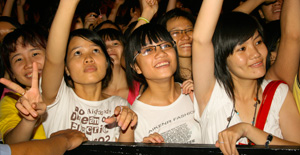Gai is from a rural village in Thailand. Recovering from a bad marriage and wanting to make a fresh start she jumped at a friend's offer to go to Japan and work in a restaurant.
On arrival she was put in an apartment and told to wait. The next day she was stripped naked by Japanese mafia, her photo taken.
'I asked, what job am I supposed to be doing? I am meant to be working in a restaurant. They laughed at me and said, 'Restaurants? Don't be stupid. There are no restaurants. Thai women here are only sold to work in brothels'.'
Gai was kept against her will in Japan for six months, forced to have sex with numerous men before being rescued. She is a victim of human trafficking.
And Gai is not alone. The International Labour Organization (ILO) estimates that there are 2.5 million victims of human trafficking every year, with more than half that number trafficked in the Asia-Pacific. In addition to sex work, people are known to be trafficked into the manufacturing, construction, garment, seafood processing, fishing and agricultural industries, as well as domestic work.
It is the second-largest illegal trade after drugs, with traffickers earning more than US$10 billion every year.
MTV Exit
Gai's full story will be told in a documentary being made by the MTV Exit (End Trafficking and Exploitation) Foundation to raise awareness about the dangers of human trafficking in South East Asia.
Operating since 2004, MTV Exit is a communications for development (C4D) campaign that targets the people most at risk of falling victim to this crime using a variety of mediums, including concerts, documentaries, made-for-TV specials, forums, and public service announcements.
C4D recognises that communication is essential to make people aware of and understand the issues that can affect their lives. It uses different communication methods to facilitate the sharing of knowledge in order to effect positive developmental change. Other successful campaigns of this type include Make Poverty History and efforts to prevent the spread of HIV.
Over the next two years, AusAID, in partnership with USAID, is helping MTV Exit raise awareness in South East Asia about human trafficking.
Modern day slavery
Human trafficking is modern day slavery. It is the buying and selling of people's lives and a clear abuse of human rights. It involves women, men and children and can result in domestic servitude, labour exploitation or prostitution.
MTV Exit will conduct a range of activities, including:
- six youth forums and roadshows in key trafficking markets–Cambodia, Indonesia, Malaysia, the Philippines, Thailand and Vietnam
- six awareness raising concerts in these countries
- 12 localised documentaries on people trafficking, which will be broadcast in Burma, Cambodia, China, Indonesia, Japan, Korea, Laos, Malaysia, Thailand, the Philippines, Taiwan and Vietnam.
The forums will educate youth leaders from at-risk communities on how to conduct awareness raising campaigns in their local areas, while the roadshows will bring the messages of the campaign and other anti-trafficking information to places where there is a high prevalence of trafficking, such as the border areas of Thailand.
MTV Exit estimates that the concerts will be attended by about 120,000 people, with many more being reached through the syndication of the concerts across the region on free-to-air networks and Asia's MTV channels.
'Since we started in 2004, more than 450,000 people have attended our concerts. Our research shows that most of the audience members come away from our events better able to protect themselves from trafficking and more prepared to take a stand against this crime,' says Matt Love, MTV Exit Campaign Manager.
Top line artists, such as Australia's Kate Miller Heidke and United Kingdom rock group Placebo, have performed at previous MTV Exit concerts in Asia. The first concert of this campaign will take place in Chiang Mai, Thailand on 25 June.
The 12 documentaries will tell the story of human trafficking in a culturally sensitive way, using local stories and local faces, broadcast on local television networks, as well as on MTV in the region. They will also be distributed to government agencies and NGOs who work in this area to improve training and build better understanding.
Vannak's story
Vannak decided to leave his home in Cambodia and search for work. His family didn't have much money and his wife was about to give birth to their first child.
He made his way across the border into Thailand, where his contact told him there was work in a fish drying factory. With little money and no options, Vannak decided to take the job.
But things turned bad quickly. When he arrived for work, he was forced onto a fishing boat.
Vannak told MTV Exit, 'The bosses moved their fingers and said 'Bang! Bang!', which meant the police would shoot me if I ran away. So I didn't dare run away.'
Vannak was enslaved on the boat for more than three years, earning no money, with little prospect of seeing his family again.
'Out of 24 hours each day, we had very little time for resting. We had to get the job done. Sometimes we worked three days and nights straight. If we took a rest we would be beaten. They kicked us, hit us and cursed at us.'
Vannak escaped by jumping overboard when the boat was docked near Malaysia and swimming to shore.
'When I got back to the land, my goal was to go back to Cambodia. The only goal I had was to go back home.'
AusAID's approach
AusAID is taking a holistic approach to addressing the heinous crime of human trafficking and its impact on victims in the Asia-Pacific. In addition to MTV Exit, AusAID also delivers other initiatives in the region that focus on protecting victims and prosecuting the perpetrators of human trafficking.
The Asia Regional Trafficking in Persons Project (ARTIP) improves the criminal justice response to this crime. Through specialised training and the creation of regional cooperation bodies, this project increases the capacity of law enforcement authorities in South East Asia to identify and prosecute traffickers, and treat victims sensitively.
AusAID partners with the ILO on Project TRIANGLE (Tripartite Action to Protect Migrants within and from the GMS from Labour Exploitation). This project works with regional governments to improve the living and working conditions of migrants. This includes direct assistance to migrant workers, increasing awareness among employers and the general public of migrant worker rights; and withdrawing migrants from their workplaces if they are being exploited.
Another AusAID project that highlights the Australian Government's long-term commitment to this area of work is Project Childhood. In partnership with the United Nations Office on Drugs and Crime and World Vision Australia, this project helps combat child sex tourism, a crime with links to trafficking and child labour. Project Childhood trains local law enforcement agencies and increases regional and international cooperation to combat this crime. It also increases community resilience against child sex tourism by conducting public education campaigns and working with governments and tourism companies on the prevention of child sex tourism.
In total, AusAID is providing more than $50 million towards anti-human trafficking and labour exploitation programs in the Asia-Pacific region.


